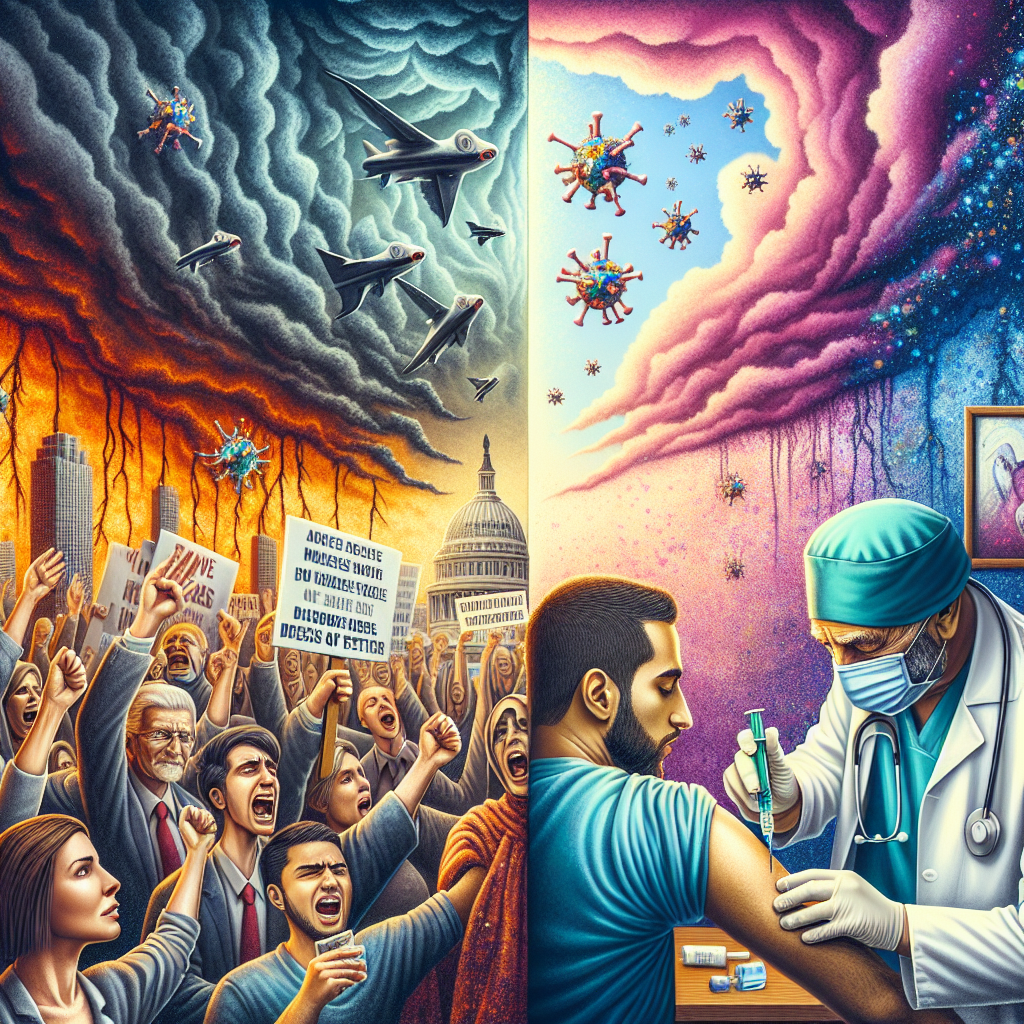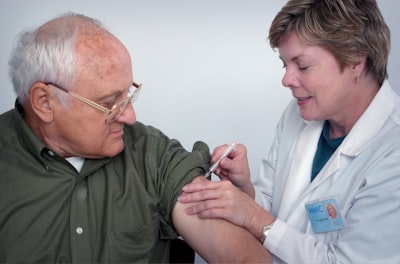Analyzing Vaccine Controversy: United States Perspectives

Key Highlights
- The United States has a complex history with vaccines, shaped by both their immense success in eradicating diseases like smallpox and polio, and persistent controversies surrounding their safety.
- Despite robust scientific evidence confirming vaccine efficacy and safety, a segment of the US population remains hesitant, fueled by misinformation and fears regarding potential adverse effects.
- The now-debunked link between the MMR vaccine and autism, propagated by discredited research, continues to influence public opinion and contribute to vaccine hesitancy.
- Concerns regarding thimerosal, a mercury-based preservative previously used in some vaccines, have also persisted despite scientific consensus that it does not cause autism or other developmental disorders.
- Addressing vaccine hesitancy requires tackling misinformation, fostering trust in scientific evidence, and emphasizing the crucial role of vaccination in safeguarding public health.
Introduction

The vaccine debate in North America, particularly in the United States and London, is a big public health problem for many Americans. Vaccines have been one of the best health tools, with numerous studies providing evidence (doi) to support their efficacy. They have controlled diseases like polio, measles, and whooping cough, including pertussis, very well, including serious conditions like encephalitis (inflammation of the brain) and other neurological disorders. However, some people are still unsure about getting vaccines. This doubt often comes from wrong information and fear of side effects. Because of this, fewer people are getting vaccinated. As a result, diseases that can be prevented are coming back. This situation is dangerous for individuals and can weaken immunity in communities.
Understanding the Vaccine Debate in the U.S.

The vaccine debate in the US is complex. It is often seen as a fight between science and personal beliefs. Most people accept vaccines. However, some communities have their worries. These worries, highlighted by the internet and social media, include fears about autism and doubts about vaccine ingredients.
To approach this debate, we need to understand the history of vaccine hesitancy through a systematic review of existing literature, including insights from the alternative medicine perspective. We also need to confront misinformation with solid scientific evidence. It is important to have respectful talks with those who hesitate about vaccines. We should listen to their fears and give them clear facts. This will help them feel confident to make smart choices about vaccination.
The Historical Context of Vaccines in America

The history of vaccines in America is filled with great achievements and some moments of worry. The defeat of smallpox, which once harmed many people, shows how strong vaccines can be. Also, the near-complete elimination of polio, a disease that created a lot of fear, shows how vaccines have changed public health for the better.
Even with these victories, getting people to accept vaccines has faced challenges. In the 19th century, fears about government control and wrong information led to anti-vaccine views. This has made it harder to fight vaccine hesitancy today.
From the early days of smallpox shots to creating the polio vaccine, the United States has tried to balance personal rights and public health needs. Knowing this complex history is important for tackling today’s vaccine discussions and helping people make smart choices.
Current State of Vaccine Sentiments

Vaccine hesitancy is when people delay or refuse vaccines, even when they are available. This issue is increasing in the United States. Most parents do choose to vaccinate their children. However, there are groups that resist, especially against childhood vaccines like the MMR vaccine.
There are many reasons for this hesitancy. Some parents worry about possible side effects. Misinformation and false claims that link vaccines to autism make these fears worse. The fast spread of this wrong information online, along with distrust of government and healthcare organizations, adds to the problem.
To tackle this issue in the United Kingdom, we need to take several steps. We should use scientific evidence, as highlighted in the Washington Post and CNN, to correct the misinformation surrounding Andrew Wakefield’s controversial claims about the measles virus in England. It’s important to build trust with healthcare providers as reliable sources. We must also highlight how vaccination can protect vulnerable groups, including autistic children, and help prevent outbreaks of diseases that can be avoided, such as those prevented by the MMR vaccine.
The Science of Vaccines

Vaccines work on a simple idea: they help the body’s defenses fight certain diseases. They do this by introducing a weakened or inactive virus or bacteria, such as the measles vaccine virus. This prompts the immune system to produce antibodies without causing any sickness. These antibodies act like guards, ready to quickly fight off the real virus if the body meets it again.
This way of preparing the immune system through immunization gives lasting protection against many infectious diseases, including influenza, at a higher risk of facing complications, particularly for pregnant women. It helps reduce the chances of getting sick and spreading the illness. The creation and use of vaccines are one of the greatest successes in modern medicine. They protect millions of people and save countless lives around the world.
How Vaccines Work: The Basics
The human immune system is a complicated network made of cells and proteins. It works to protect the body from harmful things like viruses and bacteria. Vaccines use this system to teach it how to recognize and fight specific germs.
When you get a vaccine, your immune system sees the weakened or killed parts of the germ as foreign objects. This starts an immune response. This response involves making antibodies. These are special proteins that help to target and neutralize the specific germ.
If you are exposed to the real germ later, your immune system can respond faster. The antibodies made from the vaccine quickly attach to the germ and neutralize it. This helps to stop the disease or make it less severe.
Major Milestones in Vaccine Development
The history of vaccines, including the recent Pfizer vaccine development, is full of important discoveries and hard work to fight infectious diseases. It started with Edward Jenner, who created the first vaccine for smallpox. Then came the polio vaccine made by Jonas Salk and Albert Sabin. Each of these achievements is a big win for public health.
Next was the MMR vaccination. This vaccine protects against measles, mumps, and rubella. The MMR vaccination changed how we prevent diseases. It, along with many other vaccines made over the years, has helped lower the number of childhood diseases and their serious problems.
| Vaccine | Year Introduced | Disease Targeted |
| Smallpox Vaccine | 1796 | Smallpox |
| Polio Vaccine | 1955 | Polio |
| MMR Vaccine | 1971 | Measles, Mumps, Rubella |
Vaccine Efficacy and Public Health
Vaccine efficacy shows how well a vaccine can stop disease in a specific group of people. It is carefully tested in clinical trials before being widely used. The great ability of vaccines to prevent illness is clear from the big drop in cases of diseases like measles, mumps, and rubella in countries with high vaccination rates.
Not only do vaccines protect individuals, but they also boost public health by creating herd immunity. When many people in a community are immune to a disease, it helps stop the spread. This protects others who cannot get vaccinated for health reasons, such as allergies or weak immune systems.
Vaccination Rates and Herd Immunity
Herd immunity, also called community immunity, means that many people in a group are protected from infectious diseases. This happens when a lot of people are immune to a specific pathogen. People can become immune through vaccination or previous infections. When many people are immune, it is hard for the disease to spread.
To have strong herd immunity, we need high vaccination rates. If fewer people get vaccinated, more people become vulnerable to diseases, which can lead to outbreaks. This is a problem for those who are not vaccinated and puts at risk those who cannot get vaccines due to health issues.
So, it is important to keep vaccination rates high for good disease control and to protect public health. Strong vaccination programs and health education are key to making sure that vaccines continue to help communities fight against preventable diseases.
Impact of Vaccination on Disease Eradication
Vaccination is one of the best tools we have to fight infectious diseases. A great example is smallpox, which was a harmful illness. Thanks to a global vaccination effort, smallpox was declared eradicated in 1980.
Although smallpox is the only disease fully wiped out in people, we have made great strides in managing and almost eliminating other diseases. Polio, which used to cause a lot of paralysis and death, is now close to being wiped out, with just a few countries still seeing cases.
These successes show how powerful vaccination can be in lowering the number of infections worldwide. It’s important to keep investing in vaccine research, development, and use. This will help us aim for a future without preventable diseases.
Safety Concerns and Scientific Responses
Many people still have concerns about vaccines, even though scientists agree that vaccines are safe and work well. This worry often comes from wrong information and personal stories, including fears that vaccines could lead to autism or sudden infant death syndrome (SIDS), as well as worries about what vaccines contain, as documented in studies indexed with PMID. A report from The New York Times highlights that this leads to hesitation about getting vaccinated, particularly in places like Philadelphia, which makes it hard to keep everyone healthy.
To help ease these concerns, we need to take different actions. We should share clear and honest scientific evidence. It’s also important to talk directly about wrong information and explain the strict safety steps in vaccine testing and approval. Open conversations between health workers and those with questions are key. This helps build trust and encourages people to make educated choices.
Common Vaccine Misconceptions
One big misunderstanding about vaccines is the false idea that the MMR vaccine causes autism spectrum disorder. This myth comes from a fake study that was taken back later. Many large studies have shown that this claim is not true.
Another common worry is about thimerosal, a substance that has mercury and was used in some vaccine vials in our daily life, particularly concerning various high-risk factors, including developmental delay in high-risk groups, especially in unvaccinated children. Even though thimerosal has been taken out of most childhood vaccines as a safety measure, some people still fear it. But strong scientific evidence has proven that thimerosal does not cause autism, which is often misattributed to be a cause of autism, or other developmental problems.
To clear up these misunderstandings, we need to give clear scientific information. It’s important to point out how the original claims were wrong. We should also stress that medical experts agree on the safety of vaccines.
Addressing Concerns about Vaccine Ingredients
Many people worry about the ingredients in vaccines. They often fear there may be side effects. This fear usually comes from not fully understanding why these ingredients are used and how safe they are. Vaccine manufacturers focus on safety. They carefully choose ingredients and test them thoroughly.
For example, some individuals fear mercury in vaccines. It’s important to know there are different types of mercury. Ethylmercury, found in thimerosal, is handled differently by our bodies than methylmercury, which is in some fish. Ethylmercury does not build up to dangerous levels in our bodies. Also, the small amounts of aluminum in some vaccines help boost the immune response and are safe. These amounts are much lower than what we find in food and water.
Being open about vaccine ingredients and their reasons, along with clear facts about their safety based on scientific evidence, is crucial. Doing so can help calm fears and build trust in vaccination.
Vaccine Policies and Mandates
Vaccine policies and rules are made to keep vaccination rates high and protect public health. These rules can be different from state to state in the U.S. Every state requires some vaccines for kids to enter school, but the details on how to get exemptions for medical, religious, or personal reasons change.
This mix of policies has sometimes caused differences in vaccination rates related to the pharmaceutical industry. This can lead to outbreaks of diseases that could have been prevented. The discussion about mandatory vaccination often focuses on balancing personal rights and the responsibility to keep the community healthy. This is a complicated issue that involves both ethics and society.
Federal and State Vaccine Requirements
In the United States, both federal and state agencies are important for managing vaccines and deciding vaccination rules. The CDC gives advice based on science for how and when vaccines should be given. The FDA checks the safety, effectiveness, and approval of vaccines.
The FDA can require vaccines nationwide during public health emergencies. However, rules for routine childhood vaccines are decided by each state. These rules often include needs for school entry to help keep vaccination rates high, which protects children and supports herd immunity.
All states allow medical exemptions for some children who cannot get vaccinated due to health reasons or allergies. The rules for non-medical exemptions, which are based on religious or personal beliefs, differ from state to state. This creates some debate around vaccination.
The Role of the CDC and FDA in Vaccine Approval
The CDC and FDA play crucial roles in keeping vaccines safe and effective in the United States. The FDA handles drug administration and gives approval for vaccines. They use a strict process to test vaccines before they are available to everyone.
This process starts with lab testing, known as pre-clinical testing. Then, it moves on to clinical trials with human volunteers. These trials look at the vaccine’s safety, how well it works, and any possible side effects. The results of these trials go to the FDA for examination.
The FDA’s Center for Biologics Evaluation and Research carefully reviews the data. It only allows vaccines that meet strict safety and effectiveness standards. This thorough process makes sure that vaccines are thoroughly checked before they become available to the public. This shows their strong commitment to public health.
Ethical Considerations in Vaccination
Ethical issues play an important role in the vaccination discussion. It often means finding a balance between personal freedom and the health of the whole community. People have the right to make choices about their health, such as getting vaccinated, but these choices can affect society as a whole.
The idea of beneficence focuses on the well-being of others. This is especially important when we think about people who are vulnerable and depend on herd immunity for safety. Talks about vaccination include these tough choices. They look at individual rights, but they also highlight the duty we have to protect those who are most at risk in our communities.
Balancing Individual Rights with Public Health
The clash between individual rights and public health brings up important ethical issues, especially regarding vaccination. People have the right to make choices about their health. However, vaccines create a special situation since they affect both personal health and the health of the community.
Policies that require vaccines aim to keep the public healthy and ensure adequate medical care. Still, they often lead to discussions about how far the government should go in personal health choices. Finding a balance between individual freedoms and the duty to protect vulnerable groups, like babies or those with weak immunity, is a crucial ethical question.
Having open discussions and treating each other with respect is very important when facing these ethical challenges. To find common ground, we need to listen to personal worries and highlight the benefits of vaccination for society, which include protecting those who are vulnerable and helping to stop disease outbreaks.
Vaccine Access and Equity Issues
Ensuring everyone can get vaccines is very important for reaching our health goals. Sadly, there are still big gaps in vaccine access, here in the United States and around the world. These gaps are often caused by things like income differences, where people live, and unfair systems.
To fix these issues, we need a detailed plan. This means we should make healthcare and vaccination services easier to get, especially in areas that lack resources. It is essential to remove costs that stop people from getting vaccines. We also need to make sure there are enough vaccines and help people know where to find them.
Additionally, we must focus on those most at risk, such as people with health problems and essential workers. Getting these groups vaccinated can help lessen the harsh effects of infectious diseases on their communities. Making vaccine access fair is not only important for public health but also for fairness in society.
The Role of Misinformation in Vaccine Hesitancy
Misinformation about vaccines is spread by the internet and social media. This fuels vaccine hesitancy. False claims link vaccines to autism, even though these ideas have been proven wrong. Still, some people start to doubt the safety and effectiveness of vaccinations.
It is very important to fight against this misinformation. This helps people make better choices and keeps public health safe. To do this, we need to expose the false claims, encourage media literacy, and back trustworthy information sources. We should help people think critically about what they read online and use facts to stop the spread of misinformation.
Combatting False Information Online
The internet is a great tool for sharing information. However, it can also spread false information quickly, including wrong claims about vaccines. This false information is often stirred up in emotional and convincing ways. This can influence individuals who are not sure about vaccines, leading to hesitancy.
Social media makes it harder to control this false information. The algorithms on these platforms focus on getting more engagement. This can make shocking or untrue content about vaccines more popular, spreading it further.
To fight this issue, we need a strong plan:
- Social media companies should make stricter rules to find and mark false information.
- Healthcare providers need to be active online to share correct facts and challenge wrong claims.
- People should improve their media skills to judge sources and spot false information.
Strategies for Improving Public Trust in Vaccine Controversy
Rebuilding trust in vaccines is very important for getting rid of vaccine hesitancy and keeping people healthy. We need to work together to address worries, share clear information, and have respectful conversations.
It’s crucial to show the strong scientific evidence that proves vaccines are safe and effective. We should explain how vaccines are made, tested, and watched over. Sharing details about the strict safety rules can clear up myths and confusion.
Building trust means we must also recognize the mistakes from the past. Sometimes communication about vaccines has not been clear. By talking about these past issues and being open about them, we can help build confidence in vaccination programs.
Conclusion
In conclusion, it is important to understand the issues around the vaccine debate in the U.S. This helps us make informed choices. By looking at the history, facts about how well vaccines work, safety questions, and moral issues related to vaccines, we can better understand public health policies. We need to tackle false information, build trust, and make sure everyone has fair access to vaccines. These are key steps in getting more people vaccinated and keeping our communities safe. Let’s keep talking positively, share information based on evidence, and focus on public health to fight against vaccine hesitancy.
What are the most common side effects of vaccines?
Common side effects of vaccines are usually mild and temporary. They may include pain or redness where you got the shot, a slight fever, and tiredness. These reactions show that your immune system is working to respond to the vaccine. They typically go away within a day or two.
What are some common concerns or arguments raised by vaccine skeptics in the United States?
Some usual worries from people who doubt vaccines include false ideas that vaccines cause autism. They also worry about thimerosal, which is a preservative that has mercury in it and was used in some vaccines before. Another concern is the amount of vaccines that are given to children.
What role does social media play in spreading misinformation about vaccines in the United States?
Social media platforms can unintentionally help spread false information about vaccines. This can make incorrect claims seem bigger and create doubt about vaccines. The quick sharing of unchecked information makes it harder for public health efforts to succeed.
What are some historical events or trends that have influenced vaccine attitudes and policies in the United States?
The history of vaccine rules in the US is influenced by several events. First, there were the anti-vaccination groups in the 19th century. Then, there was the Cutter incident with a bad polio vaccine. Finally, a study that linked the MMR vaccine to autism was later withdrawn. All of these events have changed how people view vaccinations and have affected health policy choices.
https://pubmed.ncbi.nlm.nih.gov/30139653
https://pubmed.ncbi.nlm.nih.gov/26978210
https://www.ncbi.nlm.nih.gov/pmc/articles/PMC1117437
https://www.cdc.gov/vaccines/parents/infographics/journey-of-child-vaccine.html
https://www.theguardian.com/society/2008/aug/30/mmr.health.media
https://www.nytimes.com/2024/03/11/briefing/covid-pandemic-anniversary.html
https://www.nytimes.com/2019/01/17/nyregion/measles-outbreak-jews-nyc.html